The calendar showed October 30, 1974, when Muhammad Ali defeated George Foreman in Kinshasa, Zaire, taking the world title for the second time in his career. The match has been described as "arguably the greatest sporting event of the 20th century" and went down in history with the name "rumble in the jungle". The fight is considered to be Ali's pinnacle moment, as he proved that he was not just a great boxer, but also an amazing "analyst" of tactics. 47 years later, the Magazine he remembers the mythical sporting rendezvous with glory, of the man who "flew like a butterfly and stung like a bee".
About a billion people around the world watched the match on television, a world record for the time. Fifty million viewers were counted among them who watched the match via closed circuit television, having made use of pay per view. Total receipts reached one hundred million dollars (half a billion today's dollars). 22 years later, in 1996, the rumble in the jungle was the subject of the Academy Award-winning documentary When We Were Kings. But let's go ahead and remember how the outsider, Muhammad Ali, managed to destroy all the predictions and defeat the absolute favorite, George Foreman.
A FEW WORDS ABOUT MUHAMMAD ALI
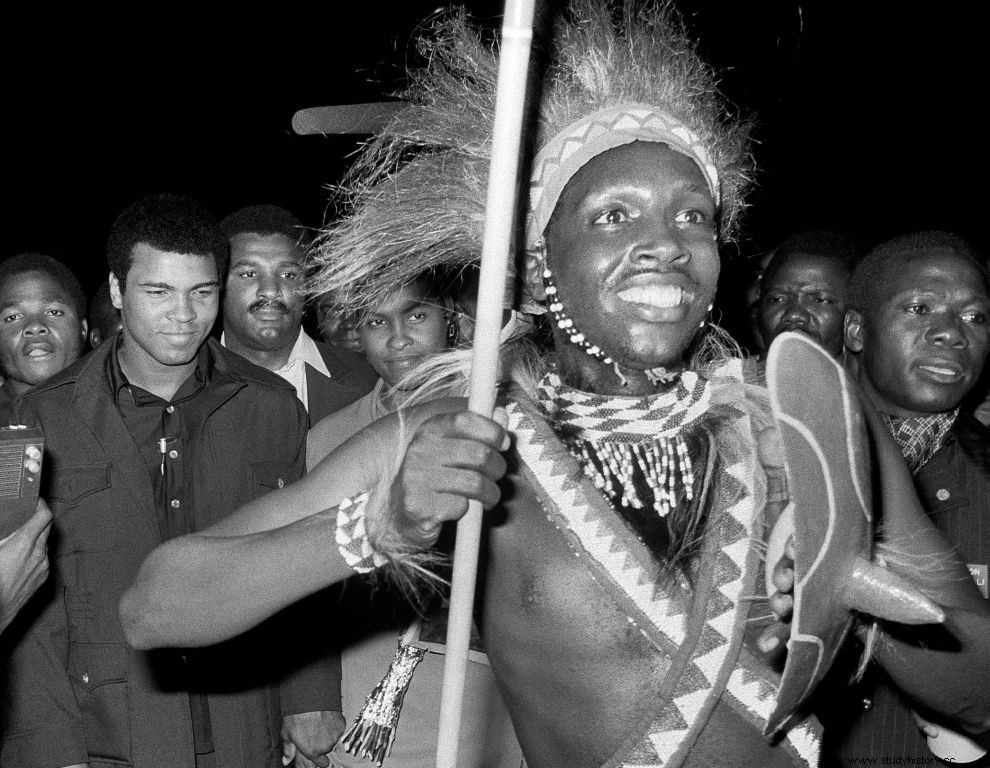
Cassius Clay (and later Muhammad Ali) was a charismatic boxer, certainly one of the best in the sport. A wonderful dancer and craftsman. The key to Ali's success was his speed. He had lightning quick hands and his left jab could decide a fight. He also had the ability to avoid his opponent's punches by using his legs a lot. During the matches he kept his hands quite low and tried to avoid the blows more with the movement of his body, instead of the usual passive defense. He used to address his opponents in a haughty and ironic style, adopting for himself the nickname "The Greatest".
Cassius Marcellus Clay Jr was born (1/17/1942) in Louisville, Kentucky and started boxing at the age of 12. As an amateur, he won six Kentucky Golden Gloves, two national Golden Gloves ("golden gloves", amateur title) and the title of US amateur boxing champion. His record as an amateur was 100 wins and 5 losses. In 1960, at the age of 18, he became the youngest boxer to win the gold medal at the Rome Olympics (in the 81 kg category). On February 25, 1964, Clay faced Sonny Liston in Miami Beach, Florida, whom he defeated by technical knockout in the seventh round.
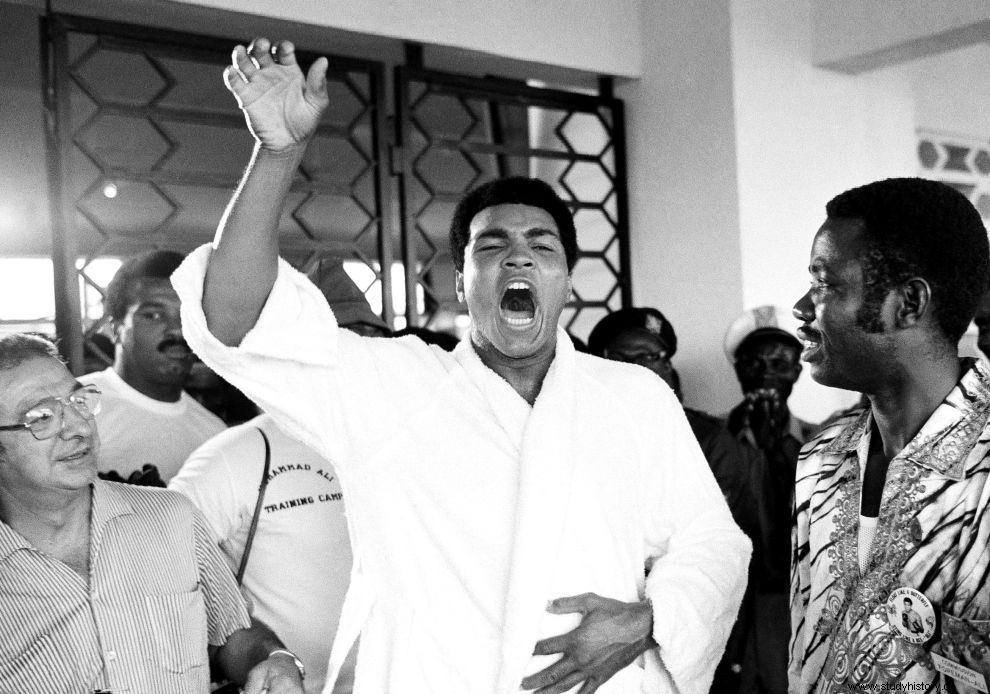
With this victory he was crowned world champion (the youngest boxer - aged 22 - to achieve this against a reigning world champion, a record later broken by Mike Tyson in his 20s). Two days after his victory, Clay announced that he had joined the Nation of Islam, an extremist organization that called the white race "demon," and shortly thereafter his spiritual guide, Elijah Muhammad, gave him the name Muhammad Ali. In the following years, Ali successfully defended his belt, but in 1967, after a trial, he was stripped of his champion title and boxing license for refusing to be drafted and fight in Vietnam.
His phrase "I ain't got no quarrel with them Viet Cong - no Viet Cong ever called me nigger" (I ain't got no quarrel with the Viet Cong, none of them ever called me a nigger), remained historic. Ali was banned from all sports in the United States for three and a half years, and in February 1970, it was Joe Frazier who beat Jimmy Ellis in New York and officially took the title of heavyweight champion of the world. In December 1970 a New York judge ruled that the revocation of Ali's boxing license was illegal and abusive and ordered immediate redress. Everything was now ready for the big return to the rings.
A FEW WORDS ABOUT GEORGE FORMAN
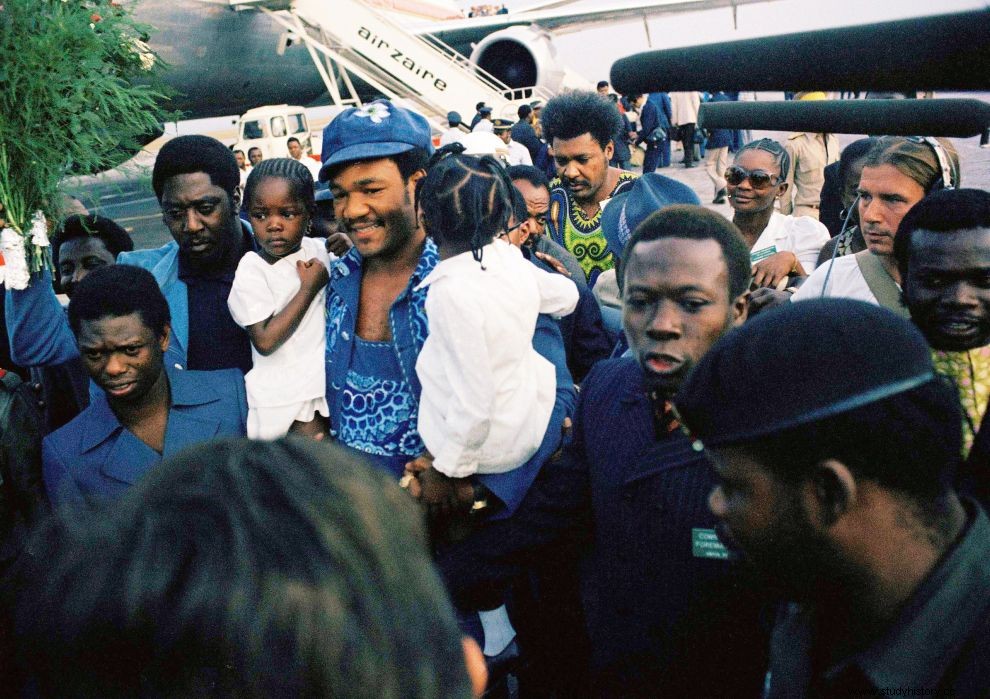
In March 1971, Ali and Frazier met at Madison Square Garden in New York and after a fight that went down in history as "the Fight of the Century", Smokin' Joe "gave" his opponent his first defeat of his career. In January 1973, Joe Frazier in turn lost his world title to George Foreman in a match known as "The Sunshine Showdown" in Kingston, Jamaica. The two opponents arrived there undefeated (Frazier 29-0 &Foreman 37-0) and it was Big George who shattered all predictions, along with Smokin' Joe, whom he knocked down six times before the stoppage in his favor. fight with technical knockout only in the second round!
George Edward Foreman was born (10/1/1949) in Marshall, Texas, began his career as an amateur boxer in 1967 and a year later, in 1968, won the gold medal in the heavyweight division at the Mexico City Olympics. From 1969 he started fighting as a professional and after being declared in 1973 as world champion, he successfully defended his title against Jose Roman (September 1973) and Ken Norton (March 1974). Big George's big weapon was his powerful hooks, while his punches were made even more "deadly" by twisting his body, thus concentrating all of his muscle groups into his fist.
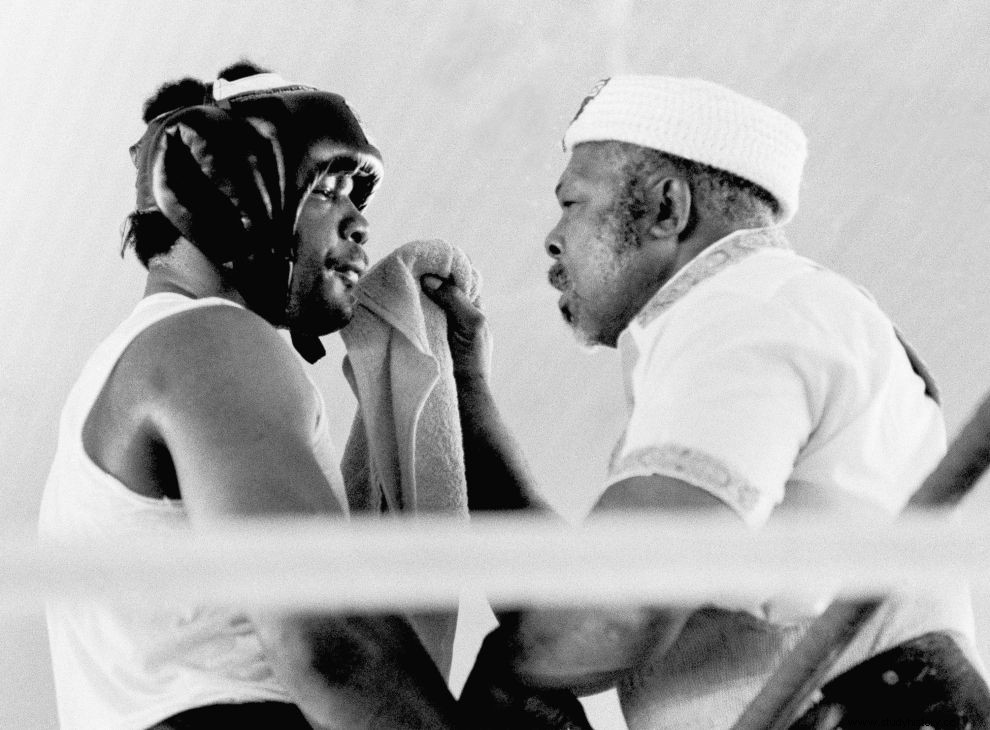
His strength, size and dominance were unquestionable and the overwhelming proof was his incredible 40-0 career record through the midway point of 1974. Even more "frightening" was the fact that of his 40 wins, 37 had come by by knockout (25 of which in the first or second round)! Meanwhile, in January 1974, Muhammad Ali faced Joe Frazier for the second time. The bout was again hosted at New York's Madison Square Garden and the prize - in addition to the money - would be the winner's right to challenge Foreman for the world title. The rematch turned out to be much easier than experts and viewers expected.
The judges unanimously gave the victory to the fitter and better prepared Ali (6-5, 7-4, 8-4) and everything was now ready for a "peak meeting" between the two "beasts". The absolute favorite was George Foreman, a real terror for any opponent. His amazing streak (40-0), had started in 1969, when he was twenty years old, and had remained "unscathed" for a full five years. Experts - who predicted an easy and quick victory for Big George - believed that the age difference would play a significant role in the matchup, since Ali was already 32, while Foreman was only 25, which would certainly give him an advantage in speed, reflexes and endurance.
THE ROAD TO THE "JUNGLE"
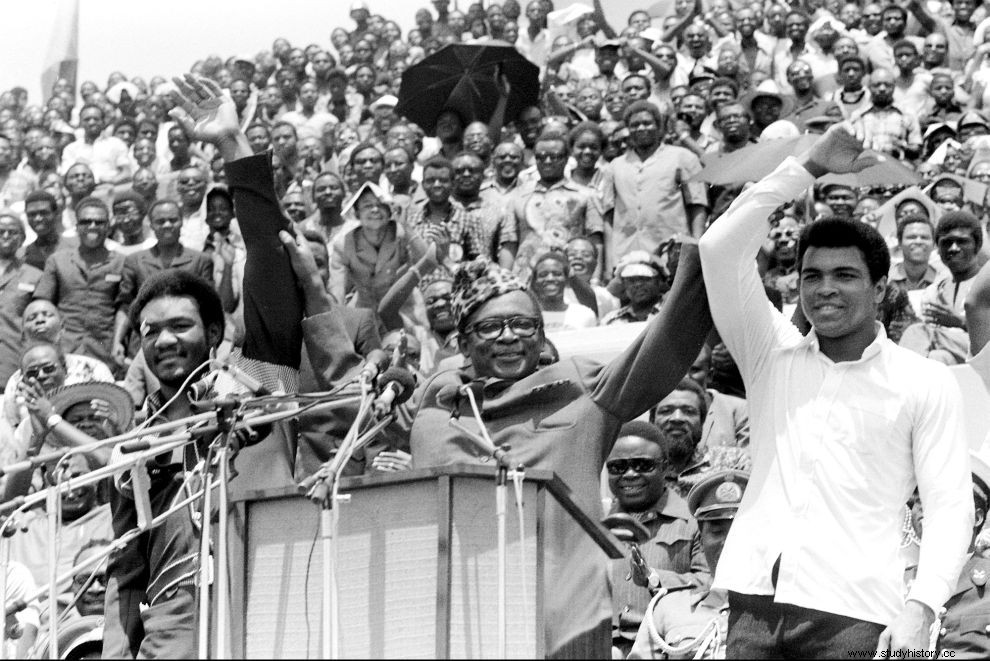
Don King, in one of his first bouts, convinced the two rivals to sign separate contracts with him, promising to secure five million dollars in prize money for each. The sum was huge for the time, but King wanted to discourage rival promoters/managers of boxing matches so that he could have the exclusivity of Ali and Foreman. After initially failing to find the money he sought in the US, King began looking abroad. Mobutu, dictator of Zaire, was convinced by Fred Wyman, an American adviser, that the organization of such a large-scale sporting event would ensure enormous international exposure for him and his country.
King, in a later television interview on the American channel METV, had revealed that there was involvement of the dictator of Libya, Muammar Gaddafi, in the collection of the money for the prizes of the two boxers, but also in other expenses for the organization of the fight, but without to go into more detail. What is certain is that Mobutu found the ten million dollars and made it available to King, while it was agreed to hold the meeting on September 25, 1974 at the "May 20" stadium in Kinshasa, the capital of Zaire (now Congo). Foreman and Ali arrived in Kinshasa eight weeks before the match, wanting to acclimatize to the conditions in Africa while also preparing for the match.
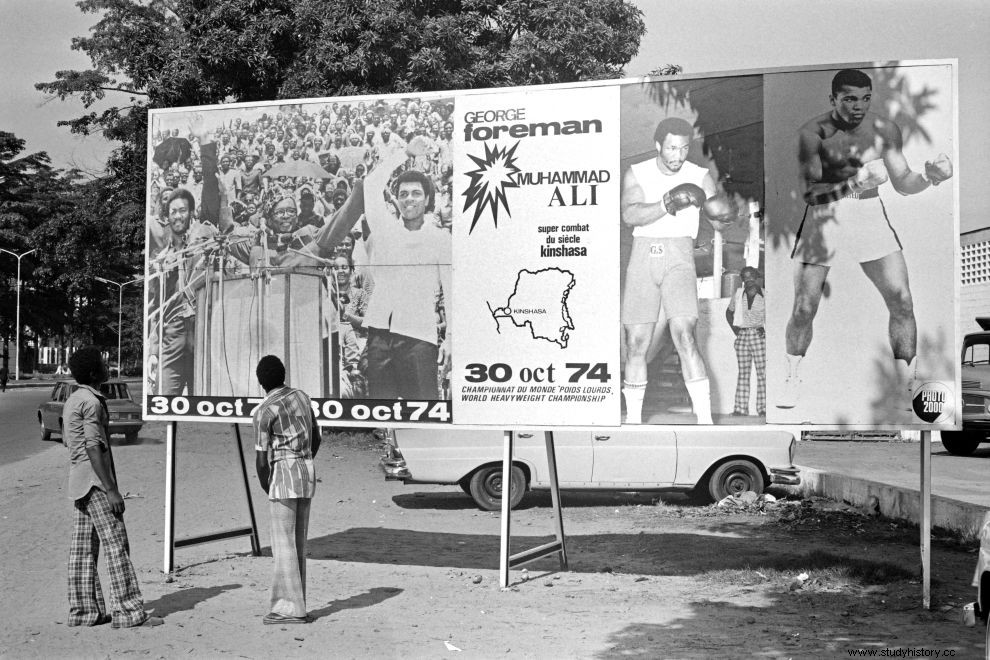
Ali was enthusiastically received by the Zaireans, who from the outset welcomed him as a hero, expressing their support for him with the now historic cry (in the local Lingala dialect) "Ali, bomaye", meaning "Ali, kill him". with Ali himself replying "Ako bo mai ye" meaning "I will kill him"! Analysts, however, did not give Ali a chance. Their first argument was that he had fought Norton and Frazier four times, losing two of them, when Foreman had dismantled both (Norton and Frazier) by knockout in the second round. The second argument (as we wrote above) was that Ali had lost a lot of his speed as well as his reflexes.
As before the fight with Sonny Liston (ten years ago), so now the experts were not giving the contender any luck. For his part, Ali was optimistic about the outcome of the fight:"If you think people were surprised by Nixon's resignation, wait until I kick Foreman's butt," he told the press! Continuing:"I've done new things in my preparation. I've wrestled an alligator, put down a whale, handcuffed a bolt of lightning, locked a thunderbolt in jail. In the last week alone I've killed a rock, wounded a stone, sent a brick to the hospital, I'm so bad I made the meds sick"!
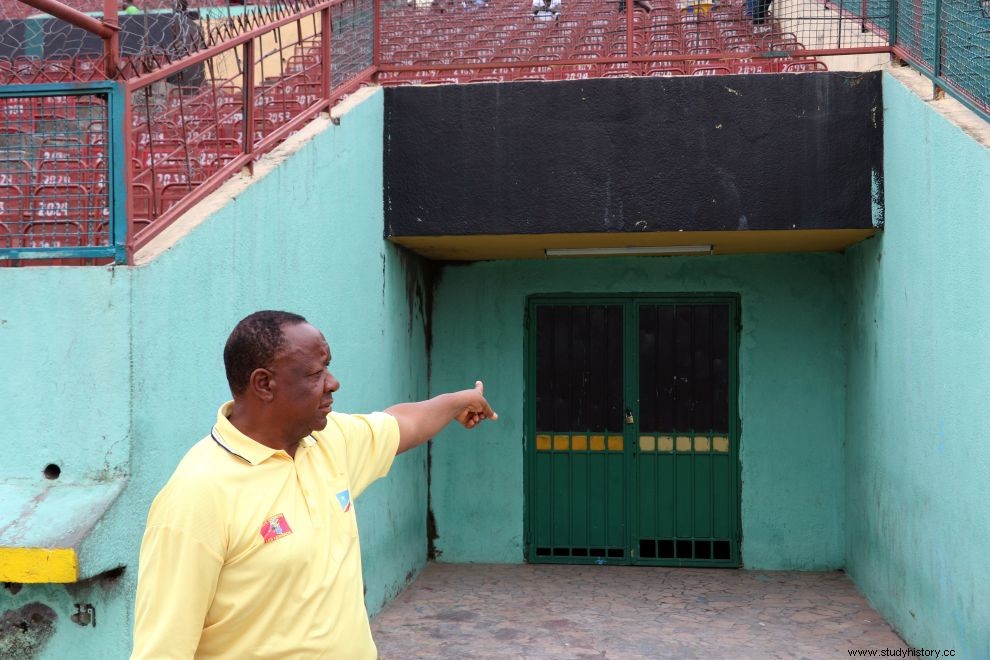
Ali's mood had been evident from the moment he arrived in Kinshasa, when he made the following statement to reporters upon stepping off the plane:"It's just a job. The grass grows, the birds fly, the waves reach the sand, I tile them on the wood"! Less than 24 hours before the fight, Foreman suffered a tear under his right eye during training and the meeting was rescheduled for October 30. Mobutu had organized a three-day music festival from September 22 to 24, which went ahead as usual, with concerts by many artists including James Brown, BB King, Celia Cruz, Bill Withers and Miriam Makeba. .
Finally the big day arrived, or rather, the big night, as the 15-lap race was scheduled for 4:00 a.m. to coincide with the high-viewing zones in the eastern US states. Zach Clayton, a former basketball and baseball player and professional boxing referee, had been selected to officiate the big match. In front of 60,000 spectators who had filled the stands of the stadium, the two rivals entered the ring:the contender Ali at 1.91 m tall and weighing 98 kg and the world champion Foreman at 1.91 m tall and weighing 100 kg. Everything was ready for the "clash".
THE RUMBLE IN THE JUNGLE (30/10/1974)
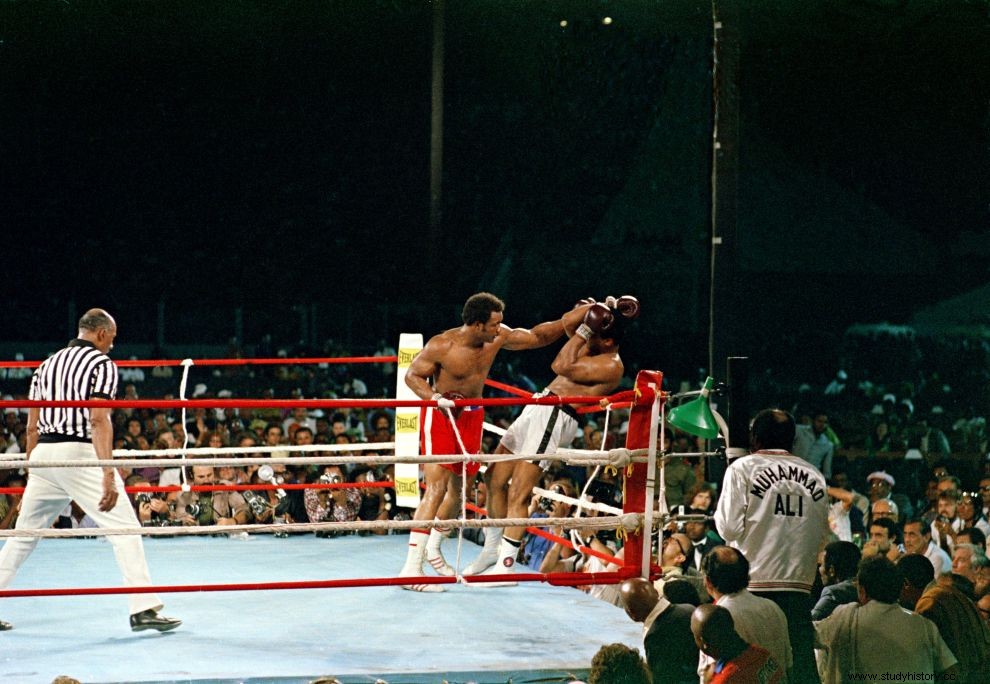
Before the fight began, it was obvious that a close-quarters battle would favor Foreman and his unbeatable punches. As soon as the referee started telling them the rules, Ali yelled at Foreman, "You've been hearing how bad I am since you were a little kid and you did it to yourself. Today I'm going to beat you so hard you'll cry like a baby"! As soon as the bell rang, Ali attacked, unleashing a barrage of right hooks to his opponent's head, but to no avail. Before the end of the first round, Foreman in turn threw the first punches at Ali. But what became clear from the first minutes, was that Big George had done special training in "closing" the spaces in the ring, preventing Ali from escaping.
Ali himself understood this, and realizing that two steps of his own against Forman's one would quickly tire him, he decided to change tactics. So, to the general astonishment of his corner, from the start of the second round, Ali began to lean against the ropes covering his head while allowing Foreman to beat him in the arms and torso. This resulted in Foreman wasting a lot of power throwing punches that either didn't hit Ali effectively or made his attempts to hit his opponent's head incredibly difficult. This tactic was called "rope a dope" and was a catalyst in the final outcome of the match.
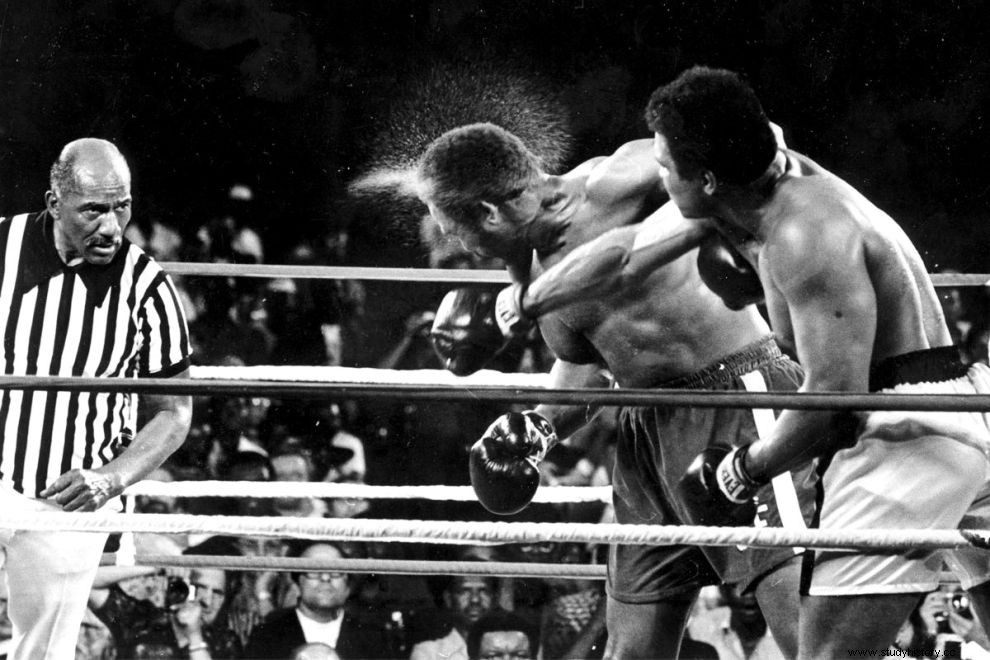
Ali was clearly testing his own strength from Foreman's pounding, waiting for his mistake while taking every opportunity to land hard direct punches to his opponent's face, which quickly began to swell. Whenever the two opponents "hugged", Ali would lean on Foreman, forcing him to carry all his weight, or hold his head down by squeezing his neck. Ali lured his opponent into these "hugs" as often as he could, provoking him to throw even more punches at him, and Foreman did just that, constantly falling into the trap.
"They told me you could punch George," Ali kept yelling at Foreman, exasperating him more and more. The spectacle was initially so unprecedented and so clearly "violated" all conventional boxing logic that several pundits watching the fight thought the encounter was probably rigged. It could not enter their minds that Ali was giving Foreman "free range" to "fire at will." After the fourth round and with Ali continuing the same tactics, Foreman began to wear himself out while taking more and more jabs and hooks from his opponent.
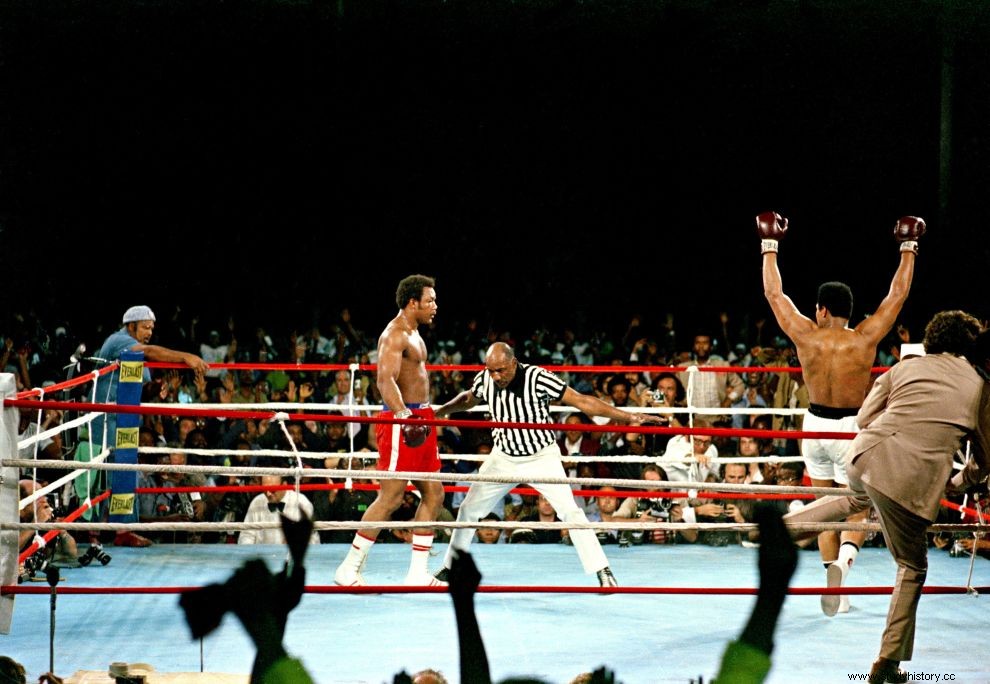
At the end of the fifth round, during which Foreman was seemingly in control, he took a barrage of blows, unable to react. Foreman himself said after the match:"I thought Ali was another knock-out candidate until the seventh round. Then I hit him hard on the jaw and he held me and whispered, 'That's all you got, George?' at the moment I realized that in front of me I did not have what I thought". Once the eighth round began, Foreman's strikes and defenses were no longer producing any results. Instead, fatigue brought exactly what Ali had been waiting patiently for so long:the critical error.
Foreman had Ali on the ropes for almost the entire round, knocking him down. With twenty seconds left, the world champion was caught completely off guard. Foreman landed a couple of right hooks, followed by a five-punch combination from Ali that first ended with a terrific left hook and was followed by a hard right straight to the face of Big George, who fell to the canvas. The "rise" time was preset to eight seconds. Foreman got up at "9", but the referee had already stopped the fight two seconds before the end of the round.
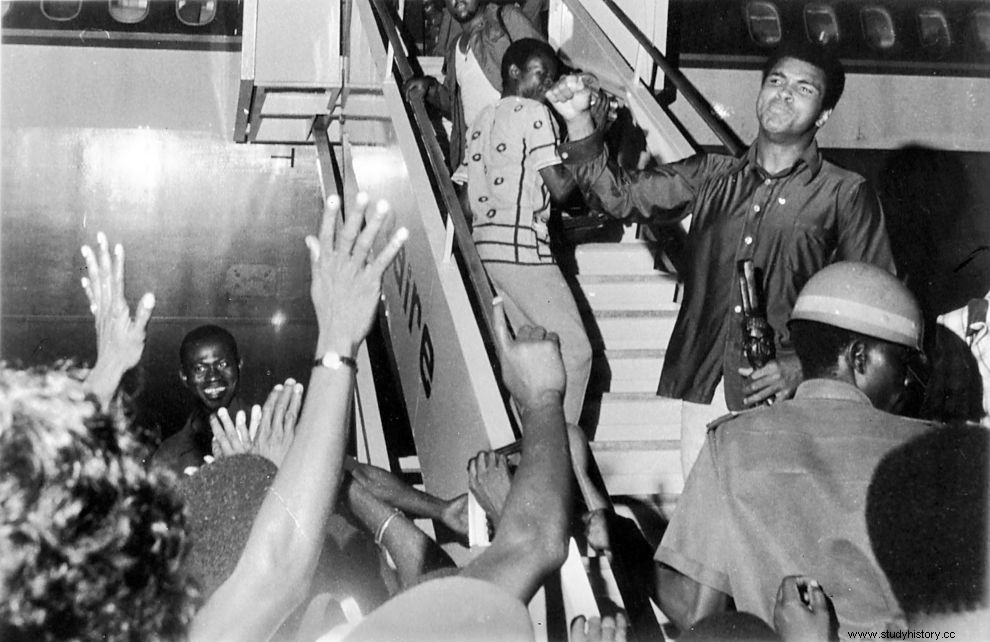
Defying all odds and delirious onlookers, Muhammad Ali won by knockout and took the title of world champion for the second time in his career, ten years after his victory over Sonny Liston. "Rumble in the Jungle" was the ultimate triumph of Ali's career, the ultimate combination of boxing skill and tactical adaptation to the opponent. Against Foreman, he completely changed his familiar dance style by applying the rope a dope. Instead of avoiding the blows with the constant movement as usual, he preferred to receive hundreds of punches from his opponent, waiting for the critical moment to perform his "miracle".
Immediately afterwards, Ali repeated to reporters that he was "the greatest", while Foreman admitted his defeat without any excuse, saying that "Ali outsmarted me and outmatched me in the fight". When asked by the press if he was considering retiring from competitive action as a world champion, Ali replied "I will stop, because there are certainly more enjoyable things to do than beat people up"! Ο Φόρμαν, με τη σειρά του, δήλωσε:"Τον χτύπησα τόσο πολύ που τον έκανα να κλάψει. Με κοίταξε και μου είπε, δε θα γλυτώσεις γι' αυτό που έκανες". Ο Φόρμαν και ο Αλί δεν ξανασυναντήθηκαν ποτέ στο ρινγκ, όμως μετά τον αγώνα συνδέθηκαν με στενή φιλία για όλη τους τη ζωή.
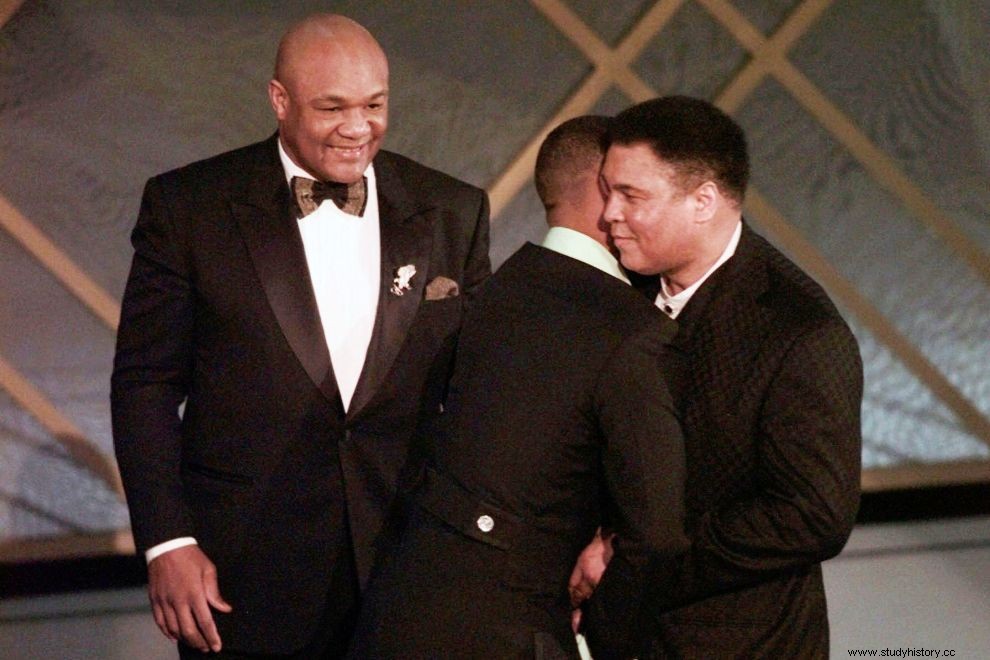
Το 1996, όταν το ντοκιμαντέρ "When we were Kings" - με θέμα εκείνον τον αγώνα - κέρδισε το Όσκαρ, οι δυο τους ανέβηκαν τιμητικά πάνω στη σκηνή, ο Φόρμαν βοηθώντας τον Αλί που ήδη είχε την ασθένεια του Πάρκινσον. Τότε ο Φόρμαν είχε πει σχετικά:"Στην καριέρα μου έχασα μόλις πέντε φορές, αλλά ο μοναδικός που πραγματικά με έκανε ασήκωτο, ήταν ο Μοχάμεντ Αλί. Δεν τον αποκαλώ τον μεγαλύτερο μποξέρ όλων των εποχών, αυτό είναι πολύ λίγο για τον Αλί. Το σημαντικό για μένα είναι ότι πρόκειται για τον καλύτερο άνθρωπο που γνώρισα ποτέ μου". Σήμερα και οι δυο αντίπαλοι του ιστορικού αγώνα της Κινσάσα είναι μέλη του International Boxing Hall of Fame.
Η συντριπτική πλειοψηφία των ειδικών της πυγμαχίας θεωρεί το "Rumble in the Jungle" όχι μόνο έναν από τους κορυφαίους αγώνες στην κατηγορία των βαρέων βαρών, αλλά και σε ολόκληρη την ιστορία της επαγγελματικής πυγμαχίας. Είναι η κορυφαία στιγμή στην καριέρα του Μοχάμεντ Αλί και μαζί με το "Fight of the Century" (Αλί vs Φρέιζερ, 1971 στο "Madison Square Garden" της Νέας Υόρκης) και το "Thrilla in Manila" (Αλί vs Φρέιζερ, 1975, στο Κουεζόν των Φιλιππίνων), αποτελεί μέρος της θαυμαστής τριλογίας του ανθρώπου που "πετούσε σαν πεταλούδα και τσιμπούσε σαν μέλισσα".
* Πηγές:espn.go.com, saddoboxing.com, ibhof.com, boxrec.com, bbc.com, wiki
* Βίντεο:Φόρμαν vs Αλί, ολόκληρος ο αγώνας και η συνέντευξη του Αλί μετά τη νίκη του (30/10/1974)
